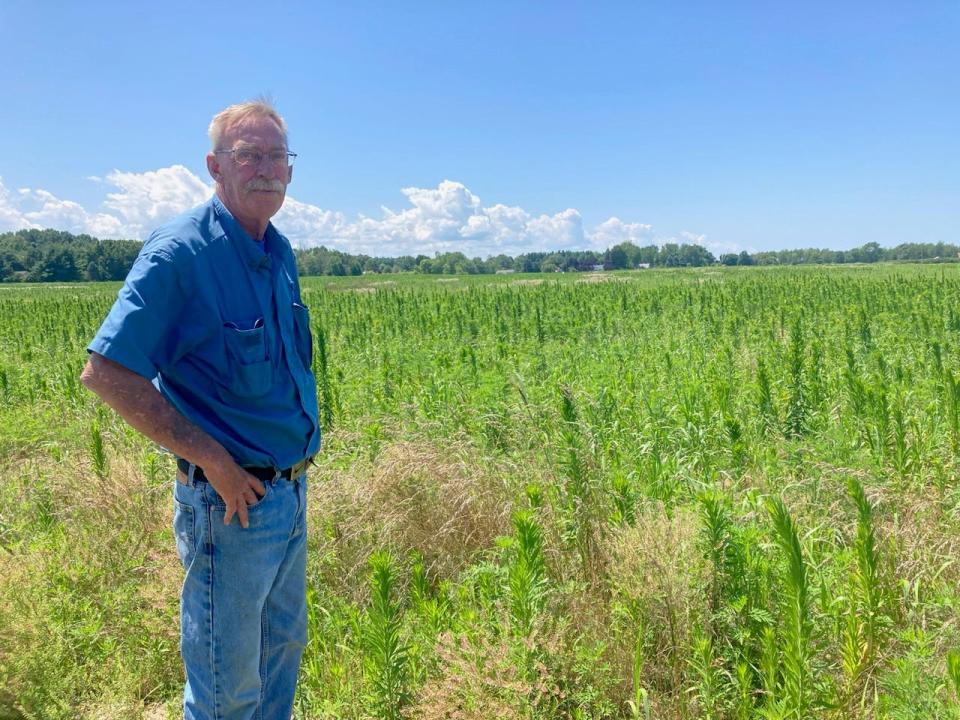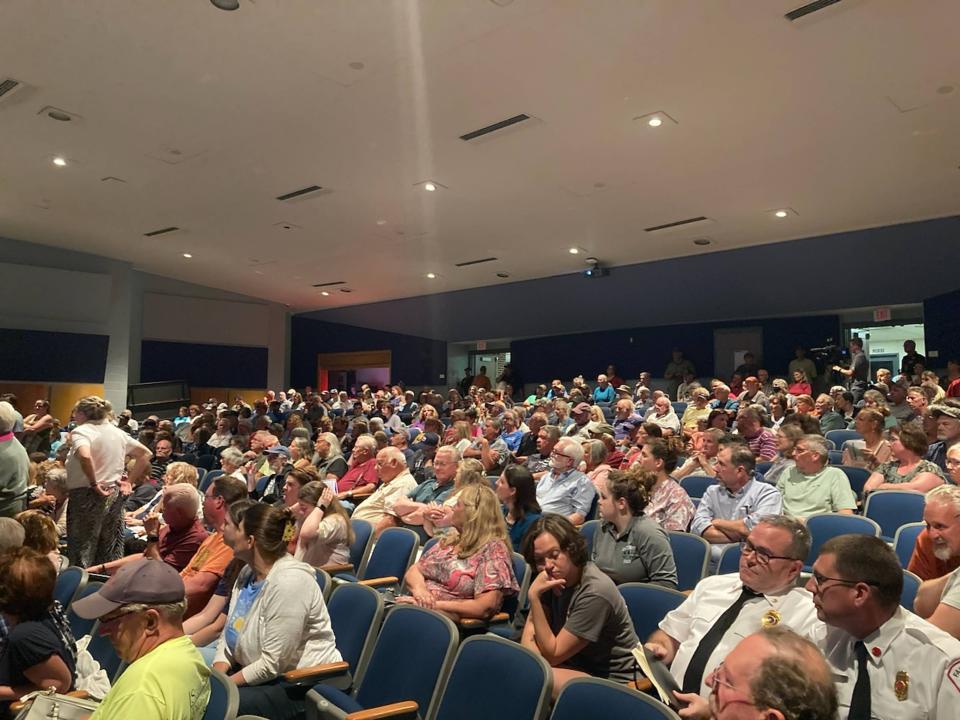Fairview business park plan? Anderson says consider the history of the Erie Co. Farm first
The process of governing matters. The process puts us on a higher level of understanding and trust in the decisions we — as a community — make, even if we still disagree on the issue or the outcome. The process matters because political leadership is about community service, not self-service.
All politics are local. We elect people to look out for our best interests as a community, working to unite us, listening to our voices, and carrying that message to the formal meetings. The process matters because we live in a democracy.
What we now seem to have are representatives who purposely divide us, mislead and avoid listening to us, push an agenda they want and not what the people want. And this haphazard agenda doesn't even have a vision, in my view, just self-serving, self-preservation motives. Both Republicans and Democrats alike are to blame when we let the extremes control the agenda and become so divisive that we cannot even discuss issues or find common ground. On any issue, particularly one that deals with the transfer of public land, the process matters.
Regarding the transfer of Erie County-owned farmland in Fairview and Girard townships to the Erie County Redevelopment Authority for the development of a business park, I believe the Erie County Council chairman should have appointed, and council members — especially the affected district's representative — should have demanded that a committee of council be formed to inform the public, gather information and ideas, and report back to Erie County Council before a vote was taken, most importantly to be transparent.
Instead, the public is left feeling this process has been rushed to sneak things through by offering scant notice. It simply appeared on the Erie County Council agenda. That is the required legal notice, but not the higher, ethical, trust-building and community-uniting notice, in my view. Does this Erie County Executive value an agenda over doing the right thing for the community? It appears he, his administration and some members of Erie County Council believe the public should get out of their way and let them tell you what it is that you want. They made this clear at the recent finance committee meeting. As reported in the Erie Times-News on Aug. 4, 2023, from the Erie County Director of Administration "(the proposal) most certainly would have stopped dead in its tracks," if there would have been prior public hearings. I think this attitude from our elected officials should anger every citizen in our community.

By making this transfer, they seem to suggest there is nothing that, we — the people — can do about it. But we still live in a democracy and there is plenty we can do. Under the Erie County Home Rule Charter and Administrative Code, we have options in Article 5, Section 9, Procedures; and Article 8, Local Agency Law. Three members of council can join to form a councilmanic investigation, or a group of citizens can file a petition in Erie County Court. We can call for a recall vote for the county executive or council members. We can vote for new people who represent us and our community interests. We can make sure the township supervisors vote this down.
The concerns that have been raised were already settled long ago when Erie County Council and the Erie County Executive together unanimously supported resolutions such as Resolution Number 71, 1982, "To Transfer Project 70 and Open Space Restrictions from the Erie County Fieldhouse to the Erie County Farm." Maximizing land use at the Erie County Fieldhouse site and generating taxes while preserving the open space integrity for recreation, well-being and farming confirms what scientists and agricultural industry experts already know — that the soil nutrients in the land at the Erie County Farm property are among the best to be found in the state. It is already serving its best productive use as open space and being preserved for the intended best use.
Remember, we also call the Erie County Farm, the "Dobler Farm." Albert F. Dobler chose Erie County and that site primarily for being "tempered by the same lake winds (as the renowned barley crops of Canada). The result has been the procuring of the choicest grade of barley from which to brew his renowned lager, which has also proven an incentive for growing barley on United States soil." (Nelson's Biographical History of Erie County, 1896, Page 780). Thus, was the United States barley industry born at the Erie County Farm! Yet, our county executive eliminated a 50-year lease with the Wiser Family Farms, who we should honor as the greatest stewards of the land.

Fight over Erie County Farm land not new
Land has a priceless value and, in my view, the open space land at the Erie County Farm remains its highest return on investment. But fights die hard in Erie County and the fight over use of this land has lasted off and on for more than 106 years. Those who have always triumphed in this fight have always had, "we the people," as the central core of its mission and the intended use to forever remain the will of the people. We can go back 185 years and document that the mission and intended use for the betterment of the people has not changed.
In the past, the Erie County Directors of the Poor (an elected position by district from 1838 until 1935) were similar to what we might consider the members of Erie County Council. The Erie County Commissioners were most similar to what we would today call the Erie County Executive. Historically, regarding the Erie County Court of Common Pleas and grand juries, the judges possessed much more public community development or political powers, and the grand juries represented the community at large to cut through political disagreements — similar to what authorities or commissions might do today.
The history of the Directors of the Poor dates back in Erie County to about 1838. By 1915, they were outgrowing their 35-acre property for the care of the county's disadvantaged residents. They sold it for $30,000 to Theodore O. Andrews on Oct. 1, 1917 (Erie County Deed Book 225, Pages 162-164) at what today is West 25th Street and Pittsburgh Avenue, and began to look for a larger space. Albert F. Dobler passed away in 1911 and his 321-acre farm in Fairview and Girard fit the vision the directors had for an almshouse to care for Erie County residents in need.
Political disagreement began with the Erie County Commissioners. By 1917, there was the potential to lose the property. The Girard Canning Company's executive management team, (Charles J. Haller, Emil E. Theilmann, Ralph McCreary and F. B. Guernsey), stepped forward and purchased the "Dobler Farm" for $96,000 from John Dobler, his wife, Rhea Dobler, and the estate of Catherine Baldinger, the heirs of Albert F. Dobler on May 31, 1917, and May 24, 1917, respectively (Erie County Deed Book 217, Pages 797-799, and Book 220, Pages 547-550). That secured title to the property and gave the Directors of the Poor more time.
According to reports published in the Erie Daily Times, on Sept. 7, 1917, the Erie County Directors of the Poor (Ralph McCreary, Emil E. Theilmann, Charles Haller, M. J. Schabacker, Charles Loesel and Scott Kimble) voted to purchase the Dobler Farm "to meet the needs of a growing city." On Sept. 19, 1917, the Directors of the Poor filed a petition in the Erie County Courts asking for approval to purchase the Dobler Farm. Then on Sept. 24, 1917, the Erie County Commissioners filed a petition objecting to the purchase, stating the Poor Directors' plan "is ill-adapted at the present time to accommodate the unfortunates of the County."
Erie County Common Pleas Judge Uriah P. Rossiter heard testimony during the last week of September 1917. By November, the grand jury came back with their report which "stated it (the Dobler Farm) was ideally located for the proposed purpose," the Erie Daily Times reported. The last week of November 1917, Rossiter handed down his opinion from the bench, "the court consented to the purchase of the Dobler Farm." Finally, Judge Rossiter confirmed the sale of the old Erie County Home and the purchase of the Dobler Farm, as the Daily Times reported on Dec. 17, 1917.
A hospital is established at Dobler farm
This cleared the way to purchase the property for $81,500 from the Girard Canning Company and they completed the transaction on Dec. 19, 1917 (Erie County Deed Book 225, Pages 606-609). Almost seven years later, the new building and grounds for a hospital to care for all were completed. Nearly 100 years ago, hope, respect and honor were expressed by citizens who were confident in the future of our community. "An institution of which the taxpayers and citizens in general of Erie County are going to be immediately proud. …There is no nobler Institution of its kind situated anywhere within the United States in a county which comes anywhere near to approximating the population of Erie County" (Erie Daily Times, Nov. 1, 1924). The Erie County Directors of the Poor operated until 1943 and were legally succeeded by the Erie County Institution District, which in turn, was legally succeeded by Erie County government.
Land for care of residents and food production
A large expansion occurred in the early 1960s, and when they dedicated the expansion of the Erie County Hospital, Arthur O. Brueckman, the hospital superintendent stated, "the aim and the responsibility of the County Hospital is to treat each individual with honor, respect and reverence that is fitting to his [our] dignity as a human being" and "40 percent of all the food is produced on the farm." (Erie Daily Times, Sept. 13, 1963).
The Erie County Commissioners later set off the land for the home lots, which now enjoy the tranquility of the recreational and open space mission, continuing the intention of the original mission of the Erie County Farm. There was a resolution of the Erie County Board of Commissioners dated Oct. 26, 1976, and a final order and decree of the Court of Common Pleas of Erie County, Civil Division, at No. 3490-A-1976 and entered March 1, 1977, for the property to properly be subdivided by Fairview Township. It was recorded on Feb. 22, 1977, in Map Book 14 at Page 101.
1978 dispute: Dobler Farm land — housing for elderly or industrial site?
In 1978, Erie County's government successfully transitioned to the Home Rule government that we have today, with an Erie County Executive and an Erie County Council elected by district to ensure the representation of all the people of Erie County. Not long after our first County Executive Russell Robison took office, he announced his plans for his priority. The newspaper headline read "housing for the elderly top County priority" and "the numbers of aged in the county are going to grow to huge proportions. We're behind already, so we better catch up." (Erie Daily Times, Aug. 31, 1978).
County Executive Robison had unanimous support of the members of Erie County Council. Then his planning and economic development team came up with a possible different plan for the Dobler Farm land — a steel mill. It was met with stiff opposition from members of Erie County Council who demanded answers on behalf of the people they represented. Councilman Karl Boyes was quoted saying, "That land is for the benefit of senior citizens and not anything else." Councilman Fiore Leone strongly agreed stating, "This is completely against what council unanimously voted for in the three-year plan, which included housing for the elderly, a care unit for the handicapped and recreation for the elderly at the Dobler Farm. I won't vote for any but the original plan and I certainly hope council sticks by the original plan, too" (Erie Daily Times, Oct. 19, 1978).
County Executive Robison met with council members at their next meeting and reaffirmed his commitment to his original plan, "that his concern is that an industry would be located in an area that is supposed to be a quiet area for the elderly" (Erie Daily Times, Nov. 4, 1978). The mission of the intended use of the Erie County Farm again remained intact.
In 1982 Erie County government deepened the reinforcement of the intended mission by ensuring the preservation and conservation of the property. It set up an official park and open space recreation area. A Declaration of Restrictions by Erie County for 84.45 acres dated Dec. 7, 1982 (recorded Sept. 9, 1988, in Erie County Record Book 63, Page 2,264) transferred Project 70 and federal HUD Open Space Land Program restrictions at Erie County Fieldhouse site to the Erie County Farm, creating what is now known as Pleasant Ridge Park. Further official action was taken by Erie County Council as Resolution 71, 1982, unanimously passed on Dec. 7, 1982.
![This is a 1983 file photo of the Erie County Fieldhouse in Millcreek Township. [Special to the Erie Times-News/Bus Scott picture/http://www.ufipax.com/scott_photos.htm]](https://s.yimg.com/ny/api/res/1.2/oUfs5UgKl4eP30A_CMTqsA--/YXBwaWQ9aGlnaGxhbmRlcjt3PTk2MDtoPTY5OQ--/https://media.zenfs.com/en/erie-times-news/d8dc31fc3c21c1e8c14d04442d1e3447)
For 50 years, I believe the historical record shows that has been the intention of Erie County government, by no action, to reaffirm a commitment to preserve the Erie County Farm as a place for quiet solitude and reflection and retain its original mission. Today, other uses could have a negative effect on property values, creating the potential for legal action against county government. There are a handful of people who remain dedicated to this community who were a part of the development of our Home Rule Government and the last planning undertaken with County Executive Russell Robison. I mention a few here: Attorney Roger Richards and Michael McCormick (who set up our Home Rule form of government in Erie County and served as close advisors to the first County Executive Russell Robison). Fiore Leone and Gary Bukowski were members of the first Erie County Council and later both served as chairmen of Erie County Council. Judy Lynch, Ph.D., was a member of the first Erie County Council and the second Erie County Executive. There may be others, but these named respected and committed members of Erie County I have the honor to know and have discussed community issues with from time to time.
We can explore other sites for business growth
By not disrupting the balance at the Erie County Farm, we can still discuss other positive ideas for land swaps to ensure we have business development in the right places — where the infrastructure, land and access points for transportation already exist. Robert Glowacki, a 50-year real estate development expert, testified at the recent Fairview Planning Commission meeting on Aug. 14 of the extensive inventory of available sites for development throughout Erie County.
If community service is the goal of this project, it should be clear that several other locations exist. The existing Fairview Business Park is one potential example.
It has been estimated by the Erie County Executive's administration with their own preliminary assessments, that of zoning officers, and experienced developers, that development of the 150 acres at the Erie County Farm will only yield 115 acres of developable land. It is my understanding that the required road infrastructure upgrades, which must include additional access points, is conservatively estimated at $15 million in public tax money. The water and sewer lines, which would have to be run from Millfair Road, must be upgraded for the additional capacity and again, a conservative estimate is $10 million of public tax money.

The county executive's plan to date only includes $4.5 million dollars of public American Rescue Plan Act funds which are intended to help those who have existed, suffered and fallen behind due to the pandemic. And most importantly under the ARPA final ruling (Page 31): "Treasury presumes that the following capital projects are generally ineligible: Construction of …or other large capital projects intended for general economic development." This is just one among many other guidelines and restrictions. And although the U.S. Treasury Department is adjusting guidelines under the Consolidated Appropriations Act of 2023, the limitations on new general economic development projects which do not predate the pandemic still have restrictions and limitations.
During my time as chairman of Erie County Council, I was brought into discussions led by those across the state in economic development positions and by state Rep. Ryan Bizzarro, D-3rd Dist. They were working towards development of a booster data center here — with realistic hopes — because Erie County had sites with the right location, size and specs for the required power and infrastructure. That is an example of how when working together, everyone can win.
It is all about what unites us for the best of community service. That is why the process matters. That is why each and every time, the long-term intended purpose of the Erie County Farm wins out. Because the will of the people to preserve that intended mission, to have a place to take care of the people — the elderly and those in need — has always been defended by the citizens of the west county in Fairview and Girard. And I suspect will always be defended and preserved.
Carl Anderson III, is a former chairman of Erie County Council and council member from the 4th District. He is a historical researcher and lifelong resident of Erie County.
This article originally appeared on Erie Times-News: Anderson explains the purpose, mission of Erie County Farm in Fairview

